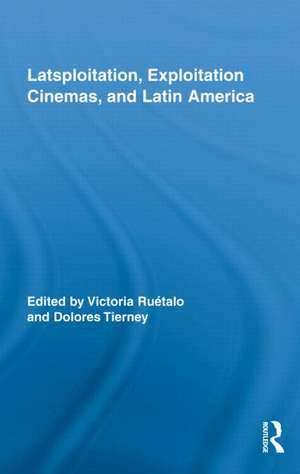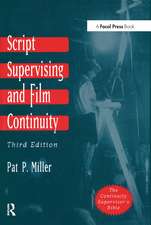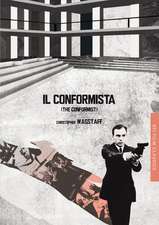Latsploitation, Exploitation Cinemas, and Latin America: Routledge Advances in Film Studies
Editat de Victoria Ruétalo, Dolores Tierneyen Limba Engleză Hardback – 20 apr 2009
| Toate formatele și edițiile | Preț | Express |
|---|---|---|
| Paperback (1) | 423.19 lei 6-8 săpt. | |
| Taylor & Francis – iul 2011 | 423.19 lei 6-8 săpt. | |
| Hardback (1) | 1059.48 lei 6-8 săpt. | |
| Taylor & Francis – 20 apr 2009 | 1059.48 lei 6-8 săpt. |
Din seria Routledge Advances in Film Studies
-
 Preț: 319.20 lei
Preț: 319.20 lei -
 Preț: 310.14 lei
Preț: 310.14 lei -
 Preț: 349.02 lei
Preț: 349.02 lei -
 Preț: 301.93 lei
Preț: 301.93 lei -
 Preț: 310.65 lei
Preț: 310.65 lei -
 Preț: 310.85 lei
Preț: 310.85 lei -
 Preț: 313.47 lei
Preț: 313.47 lei -
 Preț: 372.42 lei
Preț: 372.42 lei -
 Preț: 356.77 lei
Preț: 356.77 lei -
 Preț: 349.10 lei
Preț: 349.10 lei - 18%
 Preț: 1106.81 lei
Preț: 1106.81 lei -
 Preț: 416.06 lei
Preț: 416.06 lei - 18%
 Preț: 1116.02 lei
Preț: 1116.02 lei -
 Preț: 449.05 lei
Preț: 449.05 lei -
 Preț: 388.85 lei
Preț: 388.85 lei - 18%
 Preț: 1112.21 lei
Preț: 1112.21 lei - 18%
 Preț: 1112.34 lei
Preț: 1112.34 lei - 18%
 Preț: 1106.81 lei
Preț: 1106.81 lei - 18%
 Preț: 1106.85 lei
Preț: 1106.85 lei -
 Preț: 382.86 lei
Preț: 382.86 lei -
 Preț: 475.65 lei
Preț: 475.65 lei -
 Preț: 441.20 lei
Preț: 441.20 lei -
 Preț: 387.31 lei
Preț: 387.31 lei - 18%
 Preț: 729.62 lei
Preț: 729.62 lei - 18%
 Preț: 1056.95 lei
Preț: 1056.95 lei - 18%
 Preț: 1058.43 lei
Preț: 1058.43 lei - 18%
 Preț: 1161.62 lei
Preț: 1161.62 lei - 30%
 Preț: 848.15 lei
Preț: 848.15 lei - 18%
 Preț: 1109.99 lei
Preț: 1109.99 lei - 18%
 Preț: 1054.43 lei
Preț: 1054.43 lei -
 Preț: 398.48 lei
Preț: 398.48 lei - 18%
 Preț: 1117.43 lei
Preț: 1117.43 lei - 18%
 Preț: 1115.51 lei
Preț: 1115.51 lei - 18%
 Preț: 1114.30 lei
Preț: 1114.30 lei - 18%
 Preț: 1053.16 lei
Preț: 1053.16 lei - 18%
 Preț: 1057.75 lei
Preț: 1057.75 lei - 30%
 Preț: 820.32 lei
Preț: 820.32 lei - 18%
 Preț: 1112.34 lei
Preț: 1112.34 lei - 18%
 Preț: 1057.75 lei
Preț: 1057.75 lei - 18%
 Preț: 1117.43 lei
Preț: 1117.43 lei
Preț: 1059.48 lei
Preț vechi: 1292.06 lei
-18% Nou
Puncte Express: 1589
Preț estimativ în valută:
202.72€ • 211.68$ • 167.41£
202.72€ • 211.68$ • 167.41£
Carte tipărită la comandă
Livrare economică 15-29 aprilie
Preluare comenzi: 021 569.72.76
Specificații
ISBN-13: 9780415993869
ISBN-10: 0415993865
Pagini: 344
Ilustrații: 22 halftones
Dimensiuni: 152 x 229 x 23 mm
Greutate: 0.59 kg
Ediția:1
Editura: Taylor & Francis
Colecția Routledge
Seria Routledge Advances in Film Studies
Locul publicării:Oxford, United Kingdom
ISBN-10: 0415993865
Pagini: 344
Ilustrații: 22 halftones
Dimensiuni: 152 x 229 x 23 mm
Greutate: 0.59 kg
Ediția:1
Editura: Taylor & Francis
Colecția Routledge
Seria Routledge Advances in Film Studies
Locul publicării:Oxford, United Kingdom
Public țintă
Postgraduate and UndergraduateCuprins
List of Figures Forward, Eric Schaefer Acknowledgments Introduction: Reinventing the Frame: Exploitation and Latin America, Victoria Ruétalo and Dolores Tierney 1. Before Exploitation: Three Men of the Cinema in Mexico, Ana M. López Part I. Exploitation Beyond Borders 2. "Perversa América Latina:" The Reception of Latin American Exploitation Cinemas in Spanish Subcultures, Antonio Lázaro Reboll 3. Roger Corman Dis/covers Peru: National Cinema and Luis Llosa’s Hour of the Assassin/Misión en los Andes, Jeffrey Middents 4. "I Wonder Who the Real Cannibals Are:" Latin America and Colonialism in European Exploitation Cinema, Andrew Syder Part II. Exploitation Auteurs 5. Emilio Vieyra: Argentina’s Transnational Master of Horror, Gerard Dapena 6. Arty Exploitation, Cool Cult, and the Cinema of Alejandro Jodorowsky, Josetxo Cerdán and Miguel Fernandez Labayen 7. José Mojica Marins and the Cultural Politics of Marginality in ‘Third World’ Film Criticism, Dolores Tierney 8. More than Simply Cowboys, Naked Virgins, Werewolves and Vampires? The Transatlantic Cinema of León Klimovsky, Andrew Willis Part III. Politicizing Exploitation 9. Made in South America: Locating Snuff, Glenn Ward 10. Based on a True Story: Reality-Based Exploitation Cinema in Mexico, David Wilt 11. Con amor, tequila, y gasolina: Lola, the Truck Driver and Screen Resistance in cine fronterizo, Catherine Benamou 12. The Naco in Mexican Film: La banda del carro rojo, Border Cinema and Migrant Audience, Adán Avalos IV. Sex, Sex and More Sex 13. Temptations: Isabel Sarli Exposed, Victoria Ruétalo 14. Sharksploitation: René Cardona Jr.’s Submarine Gaze, Misha MacLaird 15. Sex and the Generals: Reading Brazilian Pornochanchada as Sexploitation, Stephanie Dennison 16. "Tus pinches leyes yo me las paso por los huevos:" Isela Vega and Mexican Dirty Movies, Sergio de la Mora 17. At the Margin of the Margins: Contemporary Ecuadorian Exploitation Cinema and the Local Pirate Market, Gabriela Alemán Notes on Contributors Bibliography Filmography Index
Recenzii
"Joining recent scholarly work on exploitation film in general, this study is the first to critique Latin American film in such detail. It will be useful to students interested in film studies and also, perhaps, in cultural and Hispanic studies. Summing Up: Recommended." --Choice
Descriere
Exploring the much neglected area of Latin American exploitation cinema, this anthology challenges established continental and national histories and canons which often exclude exploitation cinema due to its perceived ‘low’ cultural status. It argues that Latin American exploitation cinema makes an important aesthetic and social contribution to the larger body of Latin American cinema – often competing with Hollywood and more mainstream national cinemas in terms of popularity.

























